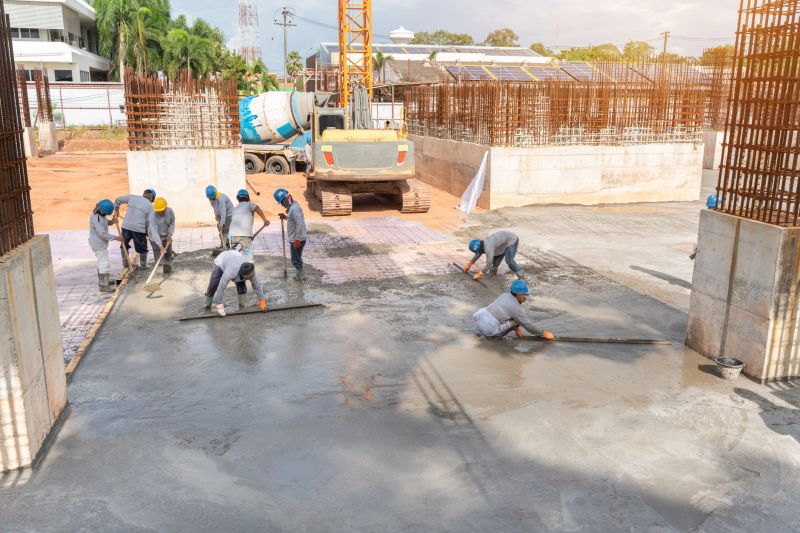Ultimate Guide To Products For Concrete Installation Success
Learn about key tools and materials that contribute to professional-grade concrete installations every time.
 Concrete installations are fundamental to many construction, landscaping, and renovation projects in Indianapolis, IN. Whether you're pouring a new driveway, creating a patio, or installing concrete pathways, selecting the right products ensures a durable and professional finish. From foundational materials to finishing tools, the variety of products available caters to different project sizes and complexities. Proper planning and choosing quality supplies can help achieve the desired results while maintaining safety and efficiency throughout the process.
Concrete installations are fundamental to many construction, landscaping, and renovation projects in Indianapolis, IN. Whether you're pouring a new driveway, creating a patio, or installing concrete pathways, selecting the right products ensures a durable and professional finish. From foundational materials to finishing tools, the variety of products available caters to different project sizes and complexities. Proper planning and choosing quality supplies can help achieve the desired results while maintaining safety and efficiency throughout the process.
Top Overall Option
Concrete Bonding and Sealant System
A versatile concrete bonding and sealant system is designed to enhance adhesion between layers and protect surfaces from moisture and wear. It is suitable for a variety of applications including overlays, repairs, and new installations. Properly applied, it can contribute to the longevity and durability of concrete projects, making it a valuable addition to any toolkit.
Types of Products For Concrete Installations
Concrete Mixes
Pre-mixed or custom-blended concrete used for pouring foundations, slabs, and other structural elements.
Form Release Agents
Products applied to molds to prevent concrete from sticking and to ensure clean removal.
Reinforcing Mesh and Rebar
Steel mesh and rebars used to strengthen concrete structures and prevent cracking.
Concrete Admixtures
Additives that modify properties of concrete such as setting time, workability, and durability.
Concrete Curing Compounds
Sprays or membranes that help retain moisture during the curing process for optimal strength development.
Surface Finishing Tools
Tools like trowels, floats, and edgers used to achieve smooth or textured concrete surfaces.
Concrete Sealers
Protective coatings that seal the surface against moisture, stains, and wear.
Expansion Joints
Materials used to accommodate movement and prevent cracking in large slabs.
Concrete Repair Products
Patches, fillers, and overlays designed to repair and restore damaged concrete surfaces.
Vibration and Compaction Equipment
Vibrators and tampers used to eliminate air pockets and ensure proper compaction.
Concrete Edging and Grooving Tools
Tools for creating decorative edges and control joints in concrete slabs.
Formwork Materials
Plywood, plastic, or metal forms used to shape poured concrete.
Concrete Pumps and Delivery Systems
Equipment to transport liquid concrete efficiently to the pour site.
Anchor Bolts and Fasteners
Hardware used to secure structures to concrete surfaces.
Concrete Coloring Agents
Pigments and dyes used to add color to concrete surfaces for aesthetic purposes.
Drainage Components
Grates, pipes, and fittings integrated into concrete installations for effective water management.
Popular Choices
Available in various formulations suitable for different load requirements and finishing styles.
Widely used to protect surfaces from stains and moisture, enhancing longevity.
Commonly selected to improve structural integrity of concrete slabs and foundations.
Popular for achieving clean finishes and prolonging mold life.
Essential for ensuring proper compaction and reducing air pockets during pouring.
Frequently used in large slabs to control cracking caused by temperature changes.
Chosen for restoring damaged or cracked surfaces with minimal disruption.
Popular for decorative concrete projects and stamped overlays.
Commonly used to achieve smooth and even finishes on freshly poured concrete.
Frequently selected for creating clean, defined edges around slabs.
Often utilized in large-scale projects to facilitate efficient concrete placement.
Popular for securing fixtures and structural elements to concrete surfaces.
Selected for integrated water management in outdoor concrete installations.
Widely used for shaping and supporting concrete during setting.
Chosen for adding vibrant or subtle hues to finished surfaces.
Commonly used for quick restoration of minor surface damages.
Popular for creating strong adhesion between old and new concrete layers.
When working with concrete, it is essential to consider the specific requirements of your project, such as load-bearing capacity, weather conditions, and aesthetic preferences. The right products can facilitate easier installation, better surface finishes, and longer-lasting results. For example, using appropriate bonding agents can improve adhesion between layers, while choosing the correct sealers can protect the surface from moisture and wear. Additionally, safety equipment and tools are vital to ensure a safe working environment.
In Indianapolis, where climate can vary, selecting products that withstand temperature fluctuations and moisture exposure is particularly important. Properly prepared and maintained concrete installations can enhance the value and functionality of residential and commercial properties. Consulting local suppliers and experts can provide insights into the most suitable products for your specific needs, ensuring a successful project from start to finish.
Key Buying Considerations
- Project scope and size to determine the quantity and type of materials needed.
- Climate conditions in Indianapolis that may influence product selection, especially for sealers and curing compounds.
- Compatibility of products with existing surfaces or materials.
- Desired finish and aesthetic effects, such as smooth, textured, or colored surfaces.
- Load-bearing requirements and structural support needs.
- Ease of application and available tools or equipment.
- Durability and resistance to moisture, freeze-thaw cycles, and wear.
- Curing time and project timeline considerations.
- Safety features and proper handling instructions for chemical products.
- Cost-effectiveness and long-term maintenance requirements.
- Availability of products from local suppliers or distributors.
- Environmental considerations, if any, related to product emissions or disposal.
- Compatibility with reinforcement materials such as rebar or mesh.
- Flexibility for future modifications or repairs.
- Brand reputation and reviews from other users.
